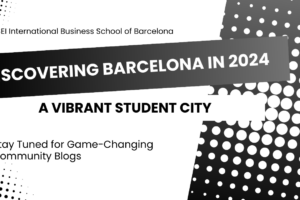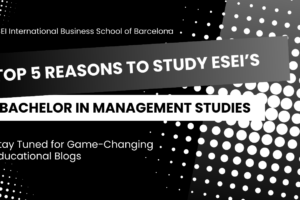
Advice from ESEI 3rd year students to 1st year student
“I always pass on good advice. It is the only thing to do with it. It is never of any use to oneself” Oscar Wilde
Oscar was at least half correct here; good advice should be passed on. Whether or not we accept it depends very much on who is telling us and how ready we are to accept it. As academic manager of a business school, me telling first year students how to be independent learners is likely to go in one ear and out of the other. It´s perfectly understandable and I didn´t listen to much advice at 18 years old either. It´s only when we reach later life that we say things like “I wish I knew then what I know now”, forgetting often that people did try to tell us these things.
So this year, we thought we might try a different approach. Instead of teachers or managers, some of our third year students are going to try to make their advice stick. We asked them the following question:
If the ESEI student wants to succeed in their studies, and in life in general, what kind of person do they need to be? What kind of actions do they need to take, and what attitudes and skills do they have to develop? How does this compare to how you see yourself now?
Their responses were genuine, reflective and, we hope, something our new students might just listen to. Have a look at what they said.
Emelie Jones advises asking ourselves questions at the start, to reflect, and use these insights to manage our approach to studying
“Opening the door to University is for most people like one of those huge doors you can see on a castle and on the other side of that door you have an enormous amount of knowledge and possibilities hiding in the corners. It is a scary step, a step that will take you into your adulthood and make you question yourself like you have never done before.
When taking this step and choosing to invest in yourself there are some key questions you should answer yourself:
Why am I here?
What do I want to get out of this?
What are my goals with my education?
Where do I want to be in 5 years?
When answering these questions you will have a good picture of what motivates you and it will also help you to manage your time wisely, both with in class activities and outside class assignments. You will be able to participate in a deeper and more valuable way both for your sake and your classmates in class discussions. To ask yourself these questions on a regular basis to compare your answers with the ones you got in the beginning of your education will also help you to monitor improvements and to see in which areas you have changed the weight of importance; maybe you have a new 5 year goal, or a more defined goal?”
It is very true that goal setting and reflection on purpose are part of becoming independent and finding internal motivation. Giselle Perez found it tough being away from her home and family in Colombia, and tells us just how important that motivation is to her “I never gave up because I never lost sight of my objective. I now proudly feel I´m getting closer; now I have only one year to finish my bachelor degree and I´ve almost achieved it.”
Of course long term objectives need short term actions and strategies, otherwise they remain intangible, impossible to measure and ultimately useless. Jenny Svensson was very honest about her biggest weakness; the ancient enemy of the student-procrastination! She told us that ”for me it is a bad habit that has followed me all through high school and which I have also taken with me to university. Instead of starting writing an assignment when it is given, start planning for the project and handing in the work proudly, I am the one stressing about it from day one, and actually start writing at the latest possible moment. Guilty as charged – even so with this assignment.” Yes it´s true that jenny sent in her advice literally 5 minutes to deadline, and this is exactly what Oscar Wilde was talking about. Her advice is, nonetheless, very good indeed.
Jenny counsels first year students to “set out a study plan. How many hours and when to study for each subject, by using time management and distributing your time well you will avoid the last minute work and learn more.” Lulu Botwey adds a poetic addendum to this by reminding us that “We are all given the same hours, minutes and seconds every day, it is how you use your time that will determine the success of your tomorrow to come” Emelie Jones counts time management as a new skill she has developed, saying that “It is so easy to procrastinate when you have an assignment to be due 3 weeks after receiving it. But by sitting down, drawing up a plan where you tackle it piece by piece and set deadlines for yourself, I feel a lot calmer and I don’t feel the same stress I have experienced before.” Perhaps Emelie could help Jenny a little with this in third year, but we will leave that up to them.
Patience and perseverance was another strong theme that emerged. Giselle Perez used to create stress for herself by being perfectionist but told us she realized that ”I focus so much on wanting my objective quickly that I get frustrated when I don’t see the result come out immediately. But life has taught me that things take their time.” However, though thing take their time as Giselle correctly says, Lulu Botwey reminds us that we need to persevere as well. “For me, to be successful is not to be served on a silver platter, you sometimes have to go through some hardship to make you stronger and push you further… The road to success is very wiggly”. It´s difficult not to listen to a piece of advice with the word “wiggly” in it and we thank her for that also.
In the classroom, Jenny Svensson bluntly reminds new students that “It is up to you how you want to use your time in the classroom, you can zone out and think about dinner or look at your phone, but later on you will have to catch up on lectures with additional work at home. When actively listening, reflect and asking questions you will change the whole learning experience and the knowledge will be easier to remember and apply at a later stage. And by taking relevant notes it will be easier to review material after lectures and for exams.” Thanks Jenny, for reminding people there is no easy route. In any case, for a person who has honestly thought about why they want to be in business school and set their own objectives, why would they then sit and waste time on whatsapp in class? Sorry, I am becoming a teacher again. Back to the students.
Jenny concludes her advice with the whole idea of the independent learner. She says that “by self-directing your studies you are taking the first initiative to maximise your learning. Being an independent student does not mean you will isolate yourself, quite the opposite, getting involved with other students for discussions or revision will help to get a deeper understanding of the subject.” By being mature, never waiting to be given information on lulu´s “silver platter”, you develop skills that will last long after university. Giselle perez advises students to “be independent, learn and investigate the most you can by yourself and take notes because by this you acquire more knowledge”.
Emelie Jones adds critical thinking to the mix, saying that “even to the small details, how I am constantly questioning the accuracy of the articles that I come upon in my daily life. This is a new skill I have developed, to be more critical in my thinking and not only when being asked but I am doing it automatically; a skill I am sure will be very beneficial for me in my career”. We can tell you all that Emelie does indeed love to question things, but in the end this is healthy. By becoming more independent, and not waiting to be told what to do, you are also much more likely to develop positively as a person, reduce stress, get better results and be happier in your path.
This advice all helps you to focus on you. Giselle Perez says that, contrary to the competitive environment fostered by some traditional business schools, “you cannot compare your skills with others. In Life there will always be competition and envy but concentrate on yourself and don’t look to your side and compare with others. Instead, look forward to your goal”
In the end, we all have to make mistakes and some of this advice will simply have to be learned the hard way. Emelie Jones reflects that “as I am entering my third year at ESEI, looking back on who I was as a person and academic learner when I started in September 2014, and comparing it to who I am today, the difference on how I see myself, plan my time and take on projects is gigantic.” There will also be change, and change is a process that takes time after all. This process continues long after university and lulu Botwey reminds us that we have to “keep being a fighter”.
So if you listen to anyone, listen to them. We all have our own story; our experiences lying in wait for us, but sometimes we might need to pause and reflect; recalibrate and reconfigure, and then move forward once more.
Now is as good a time as any to listen to wisdom.



